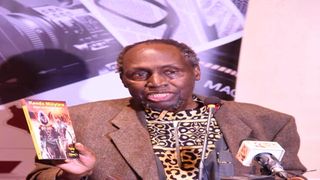
Literature scholar and author Ngugi wa Thiong’o.
| File | Nation Media GroupEducation
Premium
University of Nairobi changes must not erase gains of literature department
Why would anyone wish to study literature? Of what value is literature?
Some people pose such questions when they are unable to decipher how someone can spend a whole day listening to a story, watching a film, reading a novel or listening to music.
Literature originally just meant anything that is written down or printed. That is why we speak of financial or legal or religious literature. In this case we are referring to what money people or lawyers or religious scholars have written on a subject.
Some time in the story of humankind, literature came to mean written and sometimes performed works of creativity – a story, a poem, a play etc.
Economic value
So, why bother with literature in Kenyan universities? What value do departments of literature add to the lives of Kenyans? How, if at all, does literature add to the development of Kenya?
There are tens of answers to these questions. But it is common knowledge that literature has an economic value.
Book writing, editing, publishing, selling and reading is a multimillion industry. It doesn’t matter whether the book is printed or an e-copy. Books sell.
Books have and will always change people’s minds. Books, in many senses, format our identities and cultures.
Most progressive societies today are so because they appreciate the place of arts and culture, but more so their literature, alongside economic and technological advancement.
This is why public debate about the fate of the Department of Literature in the changes that have been proposed at the University of Nairobi is worth commenting on.
This department was established as one of the five courses in the Department of Arts in 1956 when the Royal Technical College admitted its first students.
In 1961 the college became one of the constituent colleges of the University of East Africa. It was renamed Royal College Nairobi.
In 1962 the Department of Arts became the Faculty of Arts and the Department of English Literature was established.
That name would be the cause of what is today celebrated as a revolutionary moment and movement in the study of literature and culture in formerly colonised societies.
Peter Owuor Anyumba, Taban lo Liyong and Ngugi wa Thiong’o contested the prominence given to English literature in a college in Africa. They insisted that English literature should be studied alongside literatures from Africa and other parts of the world.
The Department of English was abolished and in its place rose the Department of Literature, which Ngugi would later head.
These ideas were the precursors to what is today known as postcolonial studies.
Ngugi’s detention
However, Ngugi also argued that the value of literature and culture should be founded and celebrated beyond the university, among ordinary citizens.
This approach to literature and culture would later lead to his detention by the government, for taking theater to the people in Kamirithu, and to his dismissal from the University of Nairobi.
But even in exile, Ngugi wa Thiong’o remains the most prominent literary and cultural ambassador this country has ever produced. This is why his name is regularly mentioned at a time like this, when the Nobel Prize for Literature is about to be awarded. Ngugi’s name stands alongside the likes of Chinua Achebe, Wole Soyinka, Ama Ata Aidoo, Buchi Emecheta etc in the world of African literature.
The Department of Literature is literarily home to many Kenyans/East Africans/Africans, some of them prominent public.
Micere Mugo, a celebrated writer and poet, would become the first woman dean of the Faculty of Arts at the University of Nairobi.
The department also hosted the likes of Ngugi wa Mirii, Kimani Gecau, David Rubadiri, Okot p’Bitek and John Ruganda.
Today, distinguished scholars such as Simon Gikandi, James Ogude, Gichingiri Ndigirigi, Apollo Amoko, Dan Ojwang’, Evan Mwangi, to name but a few, are a living testimony to how far and wide the influences of the department have reached.
These scholars have significantly contributed to a thriving intellectual network that today has tens of other (young) Kenyans studying literature and culture in America, Europe, Asia and South Africa.
Entertain
John Ruganda came from Makerere and set up the Nairobi Free Travelling Theater in the Department of Literature. This theater group would perform plays for free to audiences in towns and villages where there were no formal theaters. The intention was to entertain and educate.
The group brought together students from different faculties in the university. There are lawyers, doctors, journalists and scientists who nostalgically remember their time not just being members of the Nairobi Free Travelling Theater, but for partly ‘belonging’ to the Department of Literature.
Beyond literature and theater, the graduates and influences of the Department of Literature at the University of Nairobi can be found in the Parliament, in several publishing houses, in nearly all the other universities in Kenya – either in the form of the syllabus or lecturers, in the newsroom and in thousands of classrooms across the country.
This is how the Department of Literature contributes to cultural dissemination and formation in this country.
Can we afford to simply erase or undo all the efforts of our writers, artists and cultural creators without debate?
Are we saying that in the bigger picture of modernity Kenyan culture has no value?
How can people who don’t have cultural roots progress?
We have been moving the centre all these years; why should we go back to the periphery?
The writer teaches literature and performing arts at the University of Nairobi. [email protected]





